Apparently the number of Emails The NY Times has been receiving, spurred in no small part by our coverage here of their lack of, or otherwise condescending coverage of the hundreds of reports of "irregularities" in Election 2004 has caused a "flood" to their inboxes.
Or so says the New York Times "Public Editor" Daniel Okrent who has chosen to use his Times-supplied "blog space" to speak to that "flood" in his response posted here.
That response was both tepid, apologetic, and gave no real answers to the many concerns expressed by so many of you who have sent letters. Neither did he address any of the "15 Unanswered Questions" I compiled for them, and sent directly to Mr. Okrent's "flooded mailbox".
And so, I have now replied via Email to Mr. Okrent in regards to his reponse. I urge you to do the same. Here is my Email to him...
Your recent publicly posted reply to the "overflow" of "criticisms" that your mailbox has received is much appreciated.
Unfortunately, the reply itself falls far short of any sort of reasonable explanation for the dearth of investigation and reporting from the formerly esteemed NY Times.
It's telling for a start that you chose to reply to this matter on your own internet blog (The Times and Covering Allegations of Election Fraud, 11/21) which you had "neglect[ed]...for so long" in order to speak to the complaints that The NY Times has received for inappropriately and condescendingly dismissed the hundreds (and in some cases thousands) of reports of voting irregularities as wild "conspiracy theories" of left-wing bloggers. (Please see several recent reports of this kind by Times reporter Tom Zeller, Jr. --- his EMail address, unfortunately, is not available via the Staff@nytimes.com list, so we are unable to contact him directly about his poor and dismissive reports).
The fact that you decided to address these "overflowing criticisms" on an internet space instead of the published paper pages of the The NY Times only reinforces the perception many of us have that your paper is completely missing the story and seem to regard the work of so many millions of Americans such as myself, since the morning after Election Day, as little more than a nuisance at best and crazy conspiracy theories of sore losers at worst.
Apparently (and conveniently) then, you chose to take the few letters you received that referred to "the theft of the election has been proven" in order to apologize for The Times' lack of coverage by suggesting that no such thing has occurred, and therefore, The Times has no reason to cover the hundreds and thousands of allegations of voter irregularities.
I admit that I was at least partially responsible for the many complaints you received after I posted an item on my blog about Mr. Zeller's latest insulting article and asked that folks contact The Times to complain about their lack of coverage.
In an effort to be constructive then, after my initial outrage, I posted "Some Help for The New York Times: 15 Unanswered Questions about Election 2004" and sent those 15 topics directly to you. All of them are based on actual reporting either by local news accounts or election officials. All of them refer to "proven" errors, irregularities, mistabulations and other hard facts. All of them demand further investigation and reporting. None of them are "wild conspiracy theories". However, you spoke to none of them in your internet-posted reply.
You did, however, discuss, in your reply, the "stolen election" strawman argument:
For a start, your argument above overlooks the fact that the Kerry/Edwards campaign has announced that they will be joining the Green/Libertarian recount efforts in Ohio. Perhaps that news came after you posted your note. Nonetheless, the impending recount itself --- demanded by National Presidential Candidates in the 2004 Election --- should have been ample reason enough to further investigate the charges they have been made by so many. But --- as if participation by the Democratic National Party should drive your interest in reporting on the fairness and accuracy of the most basic element of our democracy: voting --- you have also overlooked the calls of 14 different U.S. Congressional Democrats for a full GAO investigation based on the hundreds or thousands of reports of irregularities.
The GAO figured out that an investigation was warranted, apparently, long before your Editors and Reporters did as evidenced by the announcement of their investigation which is to begin immediately and which your paper covered by reprinting an AP story on the matter just today (two days after the investigation was announced!)
That report itself outlined a number of items that demand investigation, yet apparently because "nothing has been proven" you have determined that there is nothing to either report or investigate.
If you are waiting for someone else to "prove" what so much evidence points to, then you may as well simply be an Internet Bulletin Board yourself. Simply posting and linking to other stories that others have investigated and proven themselves.
You further suggest that reports at your paper "will continue to look into the issue" and that you are "confident that if they find something, they'll publish it".
Well, that's very nice, but once again, where do you get that confidence? A what explanation do either you or they have for those 15 troubling issues (and there were many more I could have mentioned) that I both posted and sent to you? Are they indeed looking into those troubling issues based on hard facts? If not, why not? And if so, what are they finding? There is certainly enough evidence based on those 15 issues alone to assign dozens of reports to get to the bottom of what may --- or may not --- be going on. Is that being done at The NY Times? Or are the one reporter and one editor you mentioned the only staffers "[continuing] to look into the issue"?
As the Public Editor, I'd expect you'd be able to evaluate stories independently of the coverage presented by the newspaper you represent and judge whether or not they are giving the proper attention to such stories. When you justify the lack of initiative taken on so many concerns with the optimistic assumption that "good investigative report[s]" would never miss such important stories if they were really there, you are making the assumption that because nothing has been reported already, than nothing must be there! I'd suggest that your job would be to independently assess the enormous body of evidence that is already available to tell you that there much needs investigating! If you're unaware of that evidence, it's your own lack of initiative on this matter --- which I repeat is at the very heart of the democracy of the world's most important democracy!
It's as if even you have been taken in by the idea that because the bulk of the mainstream media is not reporting on this (with the exception of MSNBC who has been able to devote a smart 15 minutes of coverage on average each night since the election on the various troubling reports) that there is no story. In other words, your circular reasoning seems to be such that since The Times isn't reporting it, apparently there's nothing to report on.
Exactly what part then are you playing as The NY Times' "Public Editor"? With all due respect, your response seems more appropriate for the The NY Times' "Public Relations" department!
Whether this national election will be overturned is wholly beside the point. Already a number of races and initiatives have been overturned this year due to mistabulation and misplaced and miscounted ballots. Much, if not all, of those errors were found due to unrelenting attention from average American Citizens pouring over election data and finding discrepancies. If such unfunded armchair detectives can discover such errors, image what actual professionals with funding and other resources might be able to uncover if they actually bothered to follow the various scents emitted from what smells worse and worse each day in so many different situations related to Election 2004!
Your reply then closes with this paragraph:
...Which suggests that allegations should be examined before they are given credence. Fine. I agree. So the question remains, exactly what is your paper doing to "examine the allegations"? Many of the allegations have indeed been shown to have much credence, and yet, your paper still fails, apparently, to investigate upon them to advance the story. Again, I'd point you to my "15 Unanswered Questions" and hope you will look at each one of them carefully and "examine the allegations" contained therein.
As I said, there are many more such questions to be "examined" that I didn't include, and many more that have come to light since I wrote that item and sent it to you. If you need more examples of such, please see my blog at www.BradBlog.com for just a few of them (such as a reported 106% voter turnout in Wyoming! Or Volusia County, FL election officials who claim their central processing computer was not connected to a network when screenshots have been uncovered by citizen investigators of BlackBoxVoting.org to prove that it was! The list goes on and on, Mr. Okrent! All you, or the reporters at The NY Times, need to do is "examine" them!)
Finally, I'll close this already long letter by quoting a statement that I believe your paper did print yesterday. It was made by U.S. Secretary of State Colin Powell. He said yesterday (and apparently without any intended irony):
He was speaking of the United States refusal to accept the results of the recent Election in the Ukraine. The "reports of fraud" he speaks of are, as far as we know, based on the fact that Exit Polling showed the challenging candidate as being ahead by 11%, only to lose to the incumbent party by 3% in the Final Results. Sound familiar? Sure, that could happen without fraud at the polls, in as much as it could have happened here. Exit Polls have margins of error for a reason. But the chances of it happening in the number of states that it did here, and always benefiting the "incumbant party" in virtually every state where there was a difference between Exit Poll numbers and Final Results has been pegged at a longshot 1 in 250 million by at least one university statistician/professor who bothered to "examine the evidence". Others have since validated those numbers and/or produced statistical reports showing other such troubling anomalies, some of which I mentioned in my "15 Unanswered Questions".
Anything there yet worthy of "examining the allegations" at your paper, do you suppose?
You promised, in your reply, that you would "be demanding it publicly, loudly and frequently" if so.
I hope you will take the time that your paper doesn't seem to have, to "examine the allegations" and begin --- as so many of us have --- to demand they start investigating and reporting (whatever they may end up finding!) "publicly, loudly and frequently"!
Our very democracy, or at least the people's confidence in it, may well require it!
---
Brad Friedman
Los Angeles, CA USA
Keep those managing-editor@nytimes.com; executive-editor@nytimes.com; national@nytimes.com; editorial@nytimes.com; oped@nytimes.com; public@nytimes.com; letters@nytimes.com; magazine@nytimes.com; QandA@nytimes.com; washington@nytimes.com; TheBradBlog@cville.com?Subject=Investigate and Report On Voter Irregularity, Mistabulation and Fraud NOW!">cards and letters going to The Times folks! Apparently, we have made them begin to take notice! Keep up the good work!


 No Way Home: Trump's Iran War a Spreading, Chaotic, Deadly, Disaster: 'BradCast' 3/3/26
No Way Home: Trump's Iran War a Spreading, Chaotic, Deadly, Disaster: 'BradCast' 3/3/26 'Green News Report' 3/3/26
'Green News Report' 3/3/26
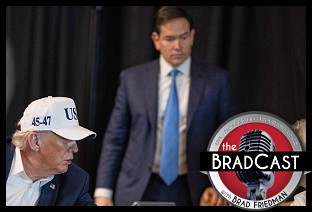 Trump Attacks Iran in 'Operation Epstein Fury': 'BradCast' 3/2/26
Trump Attacks Iran in 'Operation Epstein Fury': 'BradCast' 3/2/26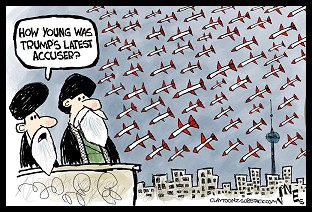 Sunday 'No, More Wars!' Toons
Sunday 'No, More Wars!' Toons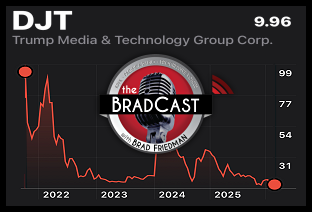 Loser Trump's Unlawful Tariffs, Failed Media Company, Corrupt SCOTUS: 'BradCast' 2/26/26
Loser Trump's Unlawful Tariffs, Failed Media Company, Corrupt SCOTUS: 'BradCast' 2/26/26 'Green News Report' 2/26/26
'Green News Report' 2/26/26 The State of the Union is ... Insane.
The State of the Union is ... Insane.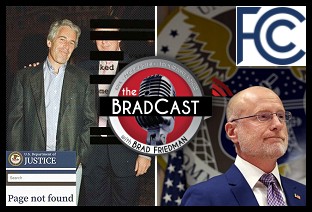 FCC's New 'Threat' to Broadcasters; NPR Confirms DOJ's 'Missing' Trump 'Rape' Docs: 'BradCast' 2/24/26
FCC's New 'Threat' to Broadcasters; NPR Confirms DOJ's 'Missing' Trump 'Rape' Docs: 'BradCast' 2/24/26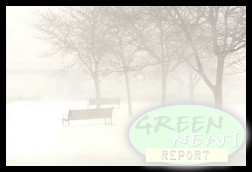 'Green News Report' 2/24/26
'Green News Report' 2/24/26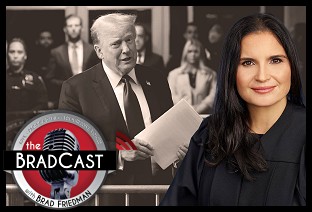 Aileen Cannon May be Covering Up Evidence of Trump Rape: 'BradCast' 2/23/26
Aileen Cannon May be Covering Up Evidence of Trump Rape: 'BradCast' 2/23/26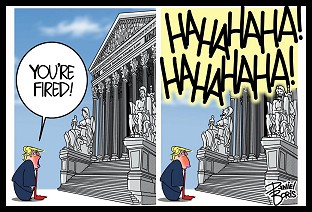 Sunday 'Plan B' Toons
Sunday 'Plan B' Toons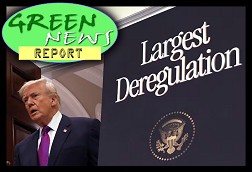 'Green News Report' 2/19/26
'Green News Report' 2/19/26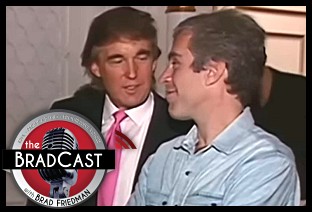 DOJ Hiding Evidence of Trump Rape, Assault Allegations: 'BradCast' 2/19/26
DOJ Hiding Evidence of Trump Rape, Assault Allegations: 'BradCast' 2/19/26 'No More Fig Leaves': Antisemitism Rising Inside MAGA, GOP: 'BradCast' 2/18/26
'No More Fig Leaves': Antisemitism Rising Inside MAGA, GOP: 'BradCast' 2/18/26 'SAVE America Act' Designed to Save GOP, Undermine Democracy: 'BradCast' 2/17/26
'SAVE America Act' Designed to Save GOP, Undermine Democracy: 'BradCast' 2/17/26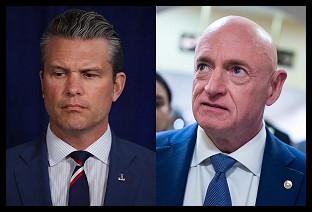 Court Blocks Hegseth Censure of Sen. Kelly
Court Blocks Hegseth Censure of Sen. Kelly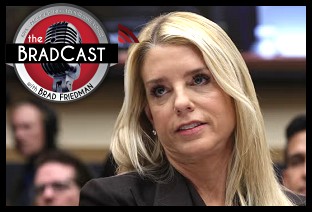 Harpy Tantrums, Legal Losses, Election Fails, Retreating ICE: 'BradCast' 2/12/26
Harpy Tantrums, Legal Losses, Election Fails, Retreating ICE: 'BradCast' 2/12/26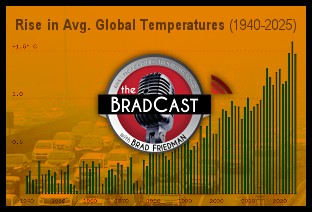 Trump to Reverse EPA's Landmark 'Endanger-ment Finding': 'BradCast' 2/11/26
Trump to Reverse EPA's Landmark 'Endanger-ment Finding': 'BradCast' 2/11/26 Trump's Racism, Corruption, 'Culture War': 'BradCast' 2/10/26
Trump's Racism, Corruption, 'Culture War': 'BradCast' 2/10/26 About Trump's FBI Raid of Fulton County, GA Election Hub: 'BradCast' 2/9/26
About Trump's FBI Raid of Fulton County, GA Election Hub: 'BradCast' 2/9/26
 VA GOP VOTER REG FRAUDSTER OFF HOOK
VA GOP VOTER REG FRAUDSTER OFF HOOK Criminal GOP Voter Registration Fraud Probe Expanding in VA
Criminal GOP Voter Registration Fraud Probe Expanding in VA DOJ PROBE SOUGHT AFTER VA ARREST
DOJ PROBE SOUGHT AFTER VA ARREST Arrest in VA: GOP Voter Reg Scandal Widens
Arrest in VA: GOP Voter Reg Scandal Widens ALL TOGETHER: ROVE, SPROUL, KOCHS, RNC
ALL TOGETHER: ROVE, SPROUL, KOCHS, RNC LATimes: RNC's 'Fired' Sproul Working for Repubs in 'as Many as 30 States'
LATimes: RNC's 'Fired' Sproul Working for Repubs in 'as Many as 30 States' 'Fired' Sproul Group 'Cloned', Still Working for Republicans in At Least 10 States
'Fired' Sproul Group 'Cloned', Still Working for Republicans in At Least 10 States FINALLY: FOX ON GOP REG FRAUD SCANDAL
FINALLY: FOX ON GOP REG FRAUD SCANDAL COLORADO FOLLOWS FLORIDA WITH GOP CRIMINAL INVESTIGATION
COLORADO FOLLOWS FLORIDA WITH GOP CRIMINAL INVESTIGATION CRIMINAL PROBE LAUNCHED INTO GOP VOTER REGISTRATION FRAUD SCANDAL IN FL
CRIMINAL PROBE LAUNCHED INTO GOP VOTER REGISTRATION FRAUD SCANDAL IN FL Brad Breaks PA Photo ID & GOP Registration Fraud Scandal News on Hartmann TV
Brad Breaks PA Photo ID & GOP Registration Fraud Scandal News on Hartmann TV  CAUGHT ON TAPE: COORDINATED NATIONWIDE GOP VOTER REG SCAM
CAUGHT ON TAPE: COORDINATED NATIONWIDE GOP VOTER REG SCAM CRIMINAL ELECTION FRAUD COMPLAINT FILED AGAINST GOP 'FRAUD' FIRM
CRIMINAL ELECTION FRAUD COMPLAINT FILED AGAINST GOP 'FRAUD' FIRM RICK SCOTT GETS ROLLED IN GOP REGISTRATION FRAUD SCANDAL
RICK SCOTT GETS ROLLED IN GOP REGISTRATION FRAUD SCANDAL VIDEO: Brad Breaks GOP Reg Fraud Scandal on Hartmann TV
VIDEO: Brad Breaks GOP Reg Fraud Scandal on Hartmann TV RNC FIRES NATIONAL VOTER REGISTRATION FIRM FOR FRAUD
RNC FIRES NATIONAL VOTER REGISTRATION FIRM FOR FRAUD EXCLUSIVE: Intvw w/ FL Official Who First Discovered GOP Reg Fraud
EXCLUSIVE: Intvw w/ FL Official Who First Discovered GOP Reg Fraud GOP REGISTRATION FRAUD FOUND IN FL
GOP REGISTRATION FRAUD FOUND IN FL

































